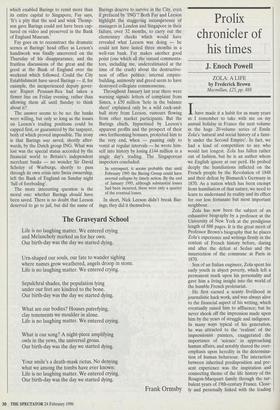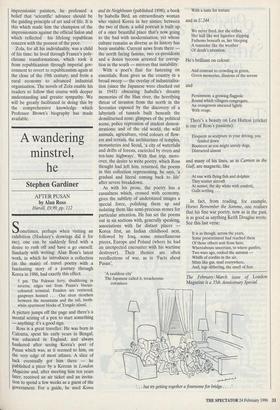Prolix chronicler of his times
J. Enoch Powell
ZOLA: A LIFE by Frederick Brown Macmillan, f25, pp. 888 Ihave made it a habit for as many years as I remember to take with me on my annual holiday in France the next volume in the huge 20-volume series of Emile Zola's 'natural and social history of a fami- ly under the Second Empire'. In fact, we had a kind of competition to see who would last longest. Zola has fallen rather out of fashion, but he is an author whom we English ignore at our peril. He probed deeply the humiliations inflicted on the French people by the Revolution of 1848 and their defeat by Bismarck's Germany in 1870. As a nation which has been exempt from humiliation of that nature, we need to learn to understand its reality and its effect for our less fortunate but most important neighbour.
Zola has now been the subject of an exhaustive biography by a professor at the University of New York at the prodigious length of 888 pages. It is the great merit of Professor Brown's biography that he places Zola's experience and writings firmly in the context of French history before, during and after the defeat at Sedan and the insurrection of the commune at Paris in 1870.
Son of an Italian engineer, Zola spent his early youth in abject poverty, which left a permanent mark upon his personality and gave him a living insight into the world of the humble French proletariat.
He first earned a scanty livelihood in journalistic hack work, and was always alive to the financial aspect of his writing, which eventually raised him to affluence; but he never shook off the impression made upon him by the years of struggle and indigence. In many ways typical of his generation, he was attracted to the 'realism' of the impressionist painters, exaggerated the importance of 'science' in approaching human affairs, and notably shared the over- emphasis upon heredity in the determina- tion of human behaviour. The interaction between inherited predisposition and pre- sent experience was the inspiration and connecting theme of the life history of the Rougon-Macquart family through the tur- bulent years of 19th-century France. Close- ly and personally linked with the leading impressionist painters, he professed a belief that 'scientific' advance should be the guiding principle of art and of life. It is this which made him the champion of the impressionists against the official Salon and which reflected his lifelong republican concern with the poorest of the poor.
Zola, for all his individuality, was a child of his time: he lived through France's poly- chrome transformations, which took it from republicanism through imperial gov- ernment to revert to republicanism again at the close of the 19th century, and from a rural economy to advanced industrial organisation. The novels of Zola enable his readers to follow that course with deeper understanding and greater sympathy. We will be greatly facilitated in doing this by the comprehensive knowledge which Professor Brown's biography has made available.



























































 Previous page
Previous page